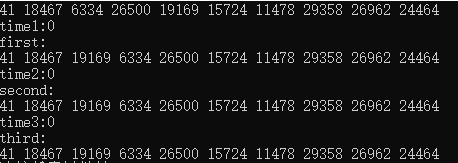Author: Zhai Tianbao Steven
Copyright notice: the copyright belongs to the author. For commercial reprint, please contact the author for authorization. For non-commercial reprint, please indicate the source
Title Description:
Input an integer array and implement a function to adjust the order of numbers in the array, so that all odd numbers are in the first half of the array and all even numbers are in the second half of the array, and ensure that the relative position between odd numbers and odd numbers, even numbers and even numbers remains unchanged.
Problem solving ideas:
The topic is simple, but you can expand your ideas. I used three methods: vector storage, list storage and user-defined linked list storage to verify the calculation efficiency. The three methods adopt the idea of traversal. In the traversal process, the odd number is stored in one container, the even number is stored in another container, and then the two containers can be combined. Among them, I have customized a linked list to connect the tail of odd linked list and the head of even linked list, which saves the process of merging containers and has high insertion efficiency. There is a complete speed comparison scheme in the follow-up of the article.
Test code:
#include <iostream>
#include <string>
#include <vector>
#include <deque>
#include <time.h>
#include <list>
using namespace std;
struct ListNode {
int val;
struct ListNode *next;
ListNode(int x) :
val(x), next(NULL) {
}
};
// Judge whether it is an odd number
bool isOdd(int number)
{
return (bool)(number % 2);
}
// Odd even separation
vector<int> OddEvenSeparate1(vector<int> input)
{
vector<int> output;
vector<int> evens;
for (int i = 0; i < input.size(); ++i)
{
if (isOdd(input[i]))
{
output.emplace_back(input[i]);
}
else
{
evens.emplace_back(input[i]);
}
}
output.insert(output.end(), evens.begin(), evens.end());
return output;
}
// Odd even separation
list<int> OddEvenSeparate2(vector<int> input)
{
list<int> output;
list<int> evens;
for (int i = 0; i < input.size(); ++i)
{
if (isOdd(input[i]))
{
output.emplace_back(input[i]);
}
else
{
evens.emplace_back(input[i]);
}
}
output.splice(output.end(), evens);
return output;
}
// Odd even separation
ListNode* OddEvenSeparate3(vector<int> input)
{
ListNode* output = new ListNode(-1);
ListNode* evens = new ListNode(-1);
ListNode* ohead = output;
ListNode* ehead = evens;
for (int i = 0; i < input.size(); ++i)
{
if (isOdd(input[i]))
{
ListNode* temp = new ListNode(input[i]);
output->next = temp;
output = output->next;
}
else
{
ListNode* temp = new ListNode(input[i]);
evens->next = temp;
evens = evens->next;
}
}
ohead = ohead->next;
ehead = ehead->next;
output->next = ehead;
return ohead;
}
int main()
{
// Given array
vector<int> a(10000);
for (int i = 0; i < a.size(); ++i)
{
a[i] = rand();
}
clock_t s, e;
// Odd even separation
// The first method
s = clock();
vector<int> b1 = OddEvenSeparate1(a);
e = clock();
cout << "time1:" << e - s << endl;
cout << "first:" << endl;
for (auto i : b1)
{
cout << i << " ";
}
cout << endl;
// The second method
s = clock();
list<int> b2 = OddEvenSeparate2(a);
e = clock();
cout << "time2:" << e - s << endl;
cout << "second:" << endl;
for (auto i : b2)
{
cout << i << " ";
}
cout << endl;
// The third method
s = clock();
ListNode* b3 = OddEvenSeparate3(a);
e = clock();
cout << "time3:" << e - s << endl;
cout << "third:" << endl;
while (b3 != nullptr)
{
cout << b3->val << " ";
b3 = b3->next;
}
cout << endl;
system("pause");
return 0;
}
Test results:
When the input array is 10 numbers, verify the accuracy of the next three methods, as shown in Figure 1.
 Figure 1. Verification accuracy
Figure 1. Verification accuracy
When the input array is 10 million, the speed under debug is shown in Figure 2.
 Fig. 2 speed comparison under release
Fig. 2 speed comparison under release
When the input array is 10 million, the speed under release is shown in Figure 3.
 Figure 3 speed comparison under debug
Figure 3 speed comparison under debug
As can be seen from the above figure, the user-defined linked list is the fastest in debug mode, but the vector is the fastest in release mode, and the user-defined linked list is slightly faster than the list in STL.
If the code needs to be improved or has any bug s, please comment and leave a message. I will correct it in time to avoid misleading others~
If the article helps you, you can point a praise to let me know, I will be very happy ~ come on!